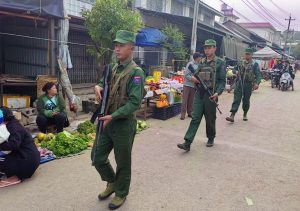Yesterday, the advocacy group Human Rights Watch (HRW) issued a statement accusing a key armed rebel group in Myanmar of abducting and forcibly recruiting civilians fleeing fighting in northern Shan State.
The Myanmar National Democratic Alliance Army (MNDAA), which is currently engaged in an ongoing offensive against Myanmar’s military junta, “is violating the laws of war by abducting and forcibly recruiting civilians, putting them at grave risk,” Elaine Pearson, HRW’s Asia director, said in the statement.
She added, “Civilians should be able to seek safety from fighting without fearing that the Myanmar military or ethnic armed groups will force them into their armies.”
On October 27, the MNDAA launched Operation 1027, an offensive targeting Myanmar military outposts in northern Shan State, along with the Arakan Army and Ta’ang National Liberation Army, its allies in the Three Brotherhood Alliance. The coalition has since made rapid progress, overrunning scores of Myanmar military outposts, capturing numerous towns, and seizing key border crossings with China. The MNDAA has now encircled Laukkai, the capital of the Kokang Self-Administered Zone (SAZ), from which it was driven out by the Myanmar military in 2009.
With armed resistance groups launching attacks in other parts of the country, Senior Gen. Min Aung Hlaing’s military government now faces the greatest challenge to its power since it seized power in February 2021.
The resulting fighting, however, has led to the mass displacement of civilian populations in northern Shan State. More than half a million people are estimated to have been displaced in the current campaign as of December 8, according to the U.N. Office for the Coordination of Humanitarian Affairs.
HRW claims that it is from this vulnerable floating population that the MNDAA has press-ganged people into its ranks. Citing local news reports, the rights group claimed that on November 24, the MNDAA abducted seven men as they traveled from Laukkai to Chinshwehaw, on the Myanmar-China border. The same reportedly happened on November 25, when MNDAA soldiers “were pulling over men who were on motorcycles in groups of twos and threes,” a doctor who left Laukkai along the same route was quoted as saying.
Similarly, on December 12, the parents of seven other young men who did not arrive home after fleeing Laukkai in late October wrote a letter to the MNDAA, pleading for their release. The letter, a copy of which was obtained by the rights group, states that they “last saw their sons being led away by MNDAA fighters near Chinshwehaw,” in HRW’s paraphrase.
HRW stated that such practices violated international humanitarian law, under which “warring parties are prohibited from arbitrarily depriving anyone of their liberty, including through abductions and forced recruitment.”
It is unclear whether the MNDAA is all that concerned about international law; nor is it likely to pay much attention to HRW’s admonition. A case could be made that the defeat of Myanmar’s noxious military junta is a goal of such importance that sometimes less than savory means might be needed to achieve this end. But the issue does raise an interesting question about the MNDAA and its relation to the broader movement seeking the overthrow of the military administration that seized power in February 2021.
In announcing the offensive on October 27, the MNDAA and its allies stated that they were “dedicated to eradicating the oppressive military dictatorship” and has widely been embraced as part of the movement, loosely led by the National Unity Government, aiming to create an inclusive federal democracy in its place. At the same time, it is hard to know how committed the group is to this goal.
The MNDAA’s past certainly suggests some reasons for skepticism. The group shares a lineage with the United Wa State Army (UWSA) and the similarly-named National Democratic Alliance Army, or Mong La group, all of which formed from the fragments of the Burmese Communist Party following its collapse in 1989. Like these latter groups, the MNDAA, led by the former communist fighter Peng Jiasheng, were granted de facto control of “special regions” in Shan State, and subsequently became key nodes of the Golden Triangle drug trade.
Even though the MNDAA claims to have ended opium cultivation, there is evidence that like the UWSA, Peng has simply branched out into synthetic drugs. “Once a source of opium,” U.S. diplomats wrote in a 2009 diplomatic cable, “the Kokang’s Special Region Number One more recently has been documented as a source of high-quality methamphetamine.” Peng also began licensing casinos catering to a border-hopping Chinese clientele.
Then, in August 2009, after Peng refuged to convert itself into a Border Guard Force under central control, the Myanmar military launched attacks on the MNDAA and drove it from power. A splinter group took control and turned Kokang – since renamed the Kokang Self-Administered Zone – into a crime-ridden limpet attached to the underside of China’s Yunnan province. In recent years, it has become home to industrial-scale online scam centers that rely on a trafficked labor force of thousands.
The MNDAA’s clear goal in the current offensive is to take back control of Kokang and wreak vengeance on those who betrayed it to the Myanmar military 14 years ago. Beyond that, it remains unclear. Perhaps the group has evolved since 2009; it has certainly said all of the right things about ending Myanmar’s military dictatorship. But HRW’s revelation about its battlefield practices raises the question of whether it is committed to anything more than the restoration of its own (non-democratic) rule over Kokang.

































